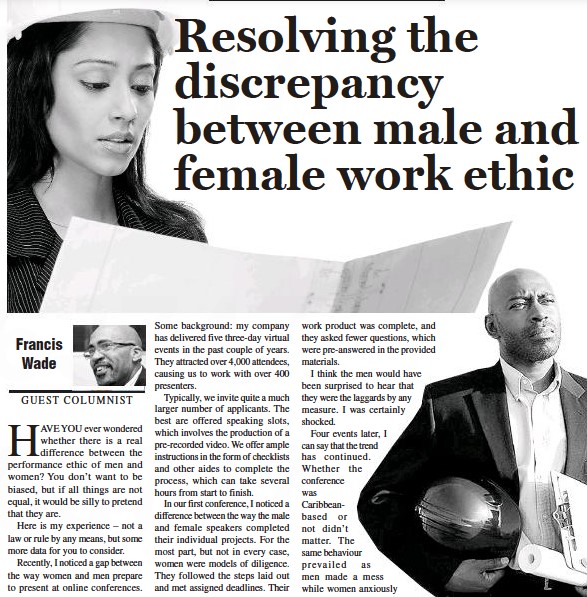Resolving the Discrepancy Between Male and Female Work Ethic
Have you ever wondered whether there is a real difference between the performance ethic of men and women? You don’t want to be biased, but if all things are not equal, it would be silly to pretend as if they are. Here is my experience – not a law or rule by any means, but some more data for you to consider.
Recently, I noticed a gap between the way women and men prepare to present at online conferences. Some background: my company has delivered five 3-day virtual events in the past couple of years. They attracted over 4,000 attendees, causing us to work with over 400 presenters.
Typically, we invite quite a much larger number of applicants. The best are offered speaking slots, which involves the production of a pre-recorded video. We offer ample instructions in the form of checklists and other aides to complete the process, which can take several hours from start to finish.
In our first conference, I noticed a difference between the way the male and female speakers completed their individual projects. For the most part (but not in every case), women were models of diligence. They followed the steps laid out and met assigned deadlines. Their work product was complete, and they asked fewer questions which were pre-answered in the provided materials.
I think the men would have been surprised to hear that they were the laggards by any measure. I was certainly shocked.
Four events later, I can say that the trend has continued. Whether the conference was Caribbean-based or not didn’t matter. The same behavior prevailed as men made a mess, while women anxiously over-performed. In fact, many of the latter were concerned that their final product might not be good enough.
By contrast, men’s submittals came in at the last-minute, with no apparent concern for its quality.
Fortunately, I function as part of a team with my wife, who has been on this journey from the beginning. Playing an equal role to mine, she is not surprised at all. After several conversations, I have concluded the following.
* Female presenters are putting in the hard work. Coming from a background of outright discrimination and exclusion, they have learned to eliminate the errors that would lead to them to “not being picked for the team.”
Furthermore, they are more likely to ask to be coached and are willing to accept guidance and put it to use. They seem to believe that the system is fair, leaving them free to focus on doing a good job.
* Male presenters appear to assume that deadlines are vague guidelines rather than operational requirements. As such, the consequences of doing their own thing are few. Feedback is rare, and if it’s offered, they are prepared to overlook it.
What are the sources of these very different behaviors? Here I can only speculate and I won’t generalize to entire genders in all situations. However, I do know that in my next conference, it would be a mistake to ignore the evidence. That would be bad for business. So take the following insights with a grain of salt, but maybe use them.
My male presenters have floated on a cushion of privilege. It truly is a man’s world…at least in their experience. As such, they can get away with rule-breaking at our events, just like everywhere in life. They need not pay close attention to changing times, or expectations. The sub-conscious assumption is that things will always work out in their favour.
As a man, I can confirm that this rings true.
However, some of my female presenters would be shocked to hear this account…at first. Upon reflection, they may realize that it explains prior experiences. Some can even cite supreme efforts to reach a high standard, only to see the selection of a man reaping the rewards of his sloppy work.
It’s unfair.
If you’re a man reading this, I encourage you to check your privilege. That safe cushion is probably being steadily deflated and when it finally goes away, you may be in trouble.
If there’s any good news, it’s that in some cases (like the one I described above), the facts are plain to see. The key for us all is to adjust our actions accordingly so that we are dealing with reality and helping others do so as well.
As managers, it makes no sense to ignore these truths. The fact that there are more female than male professionals in Jamaica is only one aspect of the picture: the part I thought was most important. Now, more than ever, I believe performance matters. Therefore, men will need to step up, just to keep up.
Francis Wade is the author of Perfect Time-Based Productivity, a keynote speaker and a management consultant. To search his prior columns on productivity, strategy, engagement and business processes, send email to columns@fwconsulting.com.

